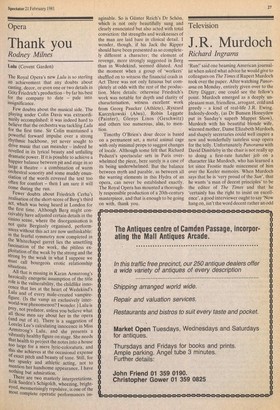Opera
Thank you
Rodney Manes
Lulu (Covent Garden) The Royal Opera's new Lulu is so sterling an achievement that any doubts about casting, decor, or even one or two details in Gotz Friedrich's production— by far his best for the company to date — pale into insignificance.
Few doubts about the musical side. The Playing under Colin Davis was extraordinarily accomplished: it was indeed hard to believe that the orchestra was tackling Lulu for the first time. Sir Colin maintained a Powerful forward impulse over a strong rhythmic backbone, yet never sought to drive music that can meander — indeed he revelled in its lyrical beauty and unfailing dramatic power. If it is possible to achieve a happier balance between pit and stage in so large a theatre — a combination of warm orchestral sonority and some muddy enunciation of the words covered the text too often for comfort — then I am sure it will come during the run. Fewer doubts about Friedrich Cerha's realisation of the short-score of Berg's third act, which was being heard in London for the first time. Although Berg might conceivably have adjusted certain details in the casino scene, where the disorganisation is not quite Bergianly organised, performances without this act are now unthinkable: in the fearful symmetry now completed in the Whitechapel garret lies the unsettling fascination of the work, the pitiless exploitation of the weak by the strong and the strong by the weak in what I suppose we must call bourgeois erotic relationship situations.
All that is missing in Karan Armstrong's heroically energetic assumption of the title role is the vulnerability, the childlike innocence that lies at the heart of Wedekind's Lulu and of every male-created vampirefigure. (Is the vamp an exclusively interworld-war phenomenon? I wonder.) Lulu is Prey, not predator, unless you believe what all those men say about her in the opera (and out of it). There is a suggestion of Lorelei Lee's calculating innocence in Miss Armstrong's Lulu, and she presents a Vibrantly healthy figure on stage. She needs that health to project the notes into a house too large for a mere lyric-coloratura, and this she achieves at the occasional expense of exact pitch and beauty of tone. Still, for her spunky and athletic acting, not to mention her handsome appearance, I have nothing but admiration. There are two masterly interpretations. Erik Saeden's Schigolch, wheezing, brighteyed, mesmerisingly repulsive, is one of the most complete operatic performances im aginable. So is Giinter Reich's Dr Scholl, which is not only beautifully sung and clearly enunciated but also acted with total conviction: the strengths and weaknesses of the man are laid bare in clinical detail. I wonder, though, if his Jack the Ripper should have been presented as so completely different a character; the element of revenge, more strongly suggested in Berg than in Wedekind, 'seemed diluted. And the moment when a group of 'workers' shuffled on to witness the financial crash in Act Three was not only fatuous but completely at odds with the rest of the production. Mere details: otherwise Friedrich's work was notable for depth and clarity of characterisation, witness excellent work from Georg Paucker (Athlete), .Ryszard Karczykowski (Alwa), Robin Leggate (Painter), Glenys Linos (Geschwitz) and others too numerous, alas, to mention.
Timothy O'Brien's dour decor is based on a permanent set, a metal animal cage with only minimal props to suggest changes of locale. Although some felt that Richard Peduzzi's spectacular sets in Paris overwhelmed the piece, here surely is a case of its being underwhelmed. But the balance between myth and parable, as between all the warring elements in this Hydra of an opera, can never be established exactly. The Royal Opera has mounted a thoroughly responsible production of a 20th-century masterpiece, and that is enough to he going on with, thank you.






































 Previous page
Previous page